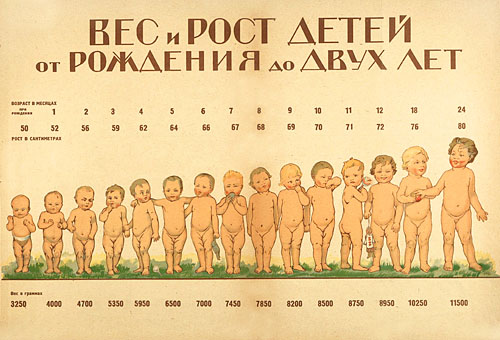The first and most important numbers on the cherished tag that you will keep for life are the weight and height of your child. The weight of a newborn baby is the main indicator of a baby's health. What is the normal birth weight of a child?
The weight of a newborn baby is determined by several factors:
- time of appearance of the child (if the baby was born ahead of schedule, his weight will naturally be less than that of full-term children);
- the complexion of the parents (for example, a child weighing 2900 grams in a miniature mother will not be considered a pathology, rather than weighing 5000 grams);
- what number of children a woman has (second and subsequent children, as a rule, are born larger than the first ones);
- lifestyle and health expectant mother during pregnancy and before it (unbalanced nutrition, frequent stress, smoking and drinking alcohol lead to the birth of children with insufficient weight, and the abuse of high-calorie foods leads to the birth of very large children, with an Rh conflict between mother and baby, the birth of a larger child is possible) .
On average, the normal weight of a child at birth is from 2500 to 4500 grams. Moreover, boys are more often born with a weight greater than that of girls. But if a newborn baby has a small weight, you should not worry, because the concept of “height and weight norm” is very relative: by the age of 6 months or a year, most children are catching up with babies with normal weight. 
Newborn baby weight change
In the first days of life, the child loses about 150 - 200 grams. This is quite normal and is caused by natural physiological reasons: the intestines are released from the first stool (meconium), swelling goes away. In addition, receiving the necessary nutrients "from the mother", after birth, the child has not yet fully adapted to get food on its own, and the feeding regimen has not yet been established. By the 4th - 5th day of life, the weight stabilizes, and from about the 10th day, it begins to increase steadily.
In addition to monthly weighings in the children's clinic, a young mother should also have scales at home to monitor her baby's weight. In order to properly monitor the weight gain of the baby, it must be weighed every week under the same conditions (day of the week, time of day, diapers). It is important to remember that children in breastfeeding, gain weight more slowly than the so-called "artists". Therefore, feeding the baby on demand is the main principle of breastfeeding. 
During the first month of life, the baby gains an average of 500 grams. By the end of the second month, the total increase is already about a kilogram.
After six months, the weight no longer increases so rapidly: about 300 - 400 grams per month. By the year your baby will weigh an average of 9 to 13.5 kilograms. According to the newborn weight gain chart, you can determine how the baby develops.
If the child receives enough food, he develops harmoniously and generally feels good. That is why it is so important that there is just enough food, neither more nor less, because excess weight can cause diathesis.
During the first year of life, not only the body weight of the child increases intensively, but also its height. So, in 12 months your baby will grow by about 1.5 times. 
What to do if your child is losing weight or not gaining it well?
The main thing is not to worry! Indeed, with frequent unnecessary worries, the mother may produce less milk or it will completely disappear, because of which the baby will be constantly hungry.
Possible reasons for underweight may include:
- insufficient amount of breast milk;
- improper attachment to the breast (in this case, the baby sucks out only the "front" milk, more liquid);
- frequent breast changes during feeding (it is better to try to feed several days from one breast, so the baby will suck everything to the end);
- hyperactivity of the child;
- defective;
- as well as various diseases.
In any case, parents should seek the help of a pediatrician to rule out possible feeding errors and the presence of any diseases.
Many young mothers and fathers, especially those who are expecting their first child, are interested in what weight of a newborn baby is the norm.
This question cannot be answered unambiguously, since the weight of a newborn child depends on many factors.
- physiology of parents . If mom and dad are tall, large build, then babies are born with more weight than miniature parents.
- if not the first pregnancy , then each next baby will weigh at birth a little more than his older brother or sister.
- gender of the child . As a rule, newborn boys, under the same conditions of the course of pregnancy, weigh more than girls.
- if multiple pregnancy , then the weight of each of the twins or triplets will naturally be less, as this is necessary for normal development several babies.
- health status of the expectant mother . Even before pregnancy, the mother needs to take measures to improve her health, as some diseases, such as diabetes, various cardiovascular diseases, can lead to the fact that the baby is born with reduced or overweight.
- mother's poor diet . Food that contains a large amount of carbohydrates, as well as excessive consumption of salt, causes fluid retention in the body, as a result, an increase in the weight of the fetus occurs, therefore, in order to endure a healthy baby, you need to follow a diet.
The norm of the weight of the newborn (boy / girl)
Official medicine considers normal the weight of a newborn from 2700g to 4000g. But these parameters are relevant only for full-term babies, that is, for gestational babies (from Latin gestatio - carrying, the age of the embryo from the moment of fertilization, corresponding to the gestational age) whose age is 37 weeks or more.
Table of height and weight of newborns (WHO standard)
|
Child's age |
Norms for a boy |
Norms for a girl |
||
|
Weight, g |
Height, cm |
Weight, g |
Height, cm |
|
|
newborn |
3200 |
3000 |
||
|
1 month |
3750 |
3500 |
||
|
2 months |
4500 |
4200 |
||
|
3 months |
5250 |
4800 |
||
|
4 months |
6000 |
5500 |
||
|
5 months |
6600 |
6200 |
||
|
6 months |
7300 |
6800 |
||
|
Seven months |
7900 |
7400 |
||
|
8 months |
8500 |
7900 |
||
|
9 months |
8860 |
8300 |
||
|
10 months |
9200 |
8600 |
||
|
11 months |
9500 |
8900 |
||
|
12 months |
9700 |
9200 |
||
There are specially designed tables for matching the weight of the fetus by weeks of development, they show the average values of the estimated weight of the baby in accordance with certain weeks of his prenatal development, that is, how much he should weigh at 10, 20, 30 weeks. If it happens that the baby was born prematurely, and his weight corresponds to the gestational age, then it means that he developed normally. In our time, more and more babies are born prematurely in time, but with a weight exceeding the average norm. In this case, the doctor notes that the baby was born prematurely, for example, 36 weeks, but large in terms of gestational age. This phenomenon cannot be unequivocally called positive, since the “extra” weight of the baby occurs most often due to edema and the reasons for its occurrence may lie in the pathological course of the mother’s pregnancy, for example, with an increase in her blood pressure, edema and toxicosis of the second half of pregnancy. Also, there is often a difficult adaptation of a baby with a weight exceeding the tabular figures.
What is the reason for the low weight of the newborn?
The small weight of children is most often associated with malnutrition of the mother during pregnancy. Such babies are under the supervision of doctors and are not discharged home until they gain a weight of 2600g. It is generally accepted that large children are calmer, sleep and eat better, but do not forget that the behavior of babies depends on many factors and how calm a baby will often have nothing to do with its weight. normal weight of a newborn is purely individual and can be determined by a combination of many factors. Children are all different, there are big ones, there are small ones, but any deviation from the norm can be a reason to play it safe by contacting a qualified specialist.
Immediately after the birth of the child, weigh and measure his height. Over the next months of life little man more than once will be subjected to this procedure,
after all, weight and height are one of the main indicators by which pediatricians evaluate him physical development. Norm or not?
It is important to know that not always high weight is an indicator of good health, and low weight is a cause for alarm. The body weight and height of a child at birth depend on many factors. First of all, from heredity. If the parents of the baby are tall and have a large body weight, it is likely that their child will be large from the moment of birth, and vice versa.
The average weight of a newborn baby ranges from 3,000 to 4,000 g with a normal gestational age of 38-40 weeks. In this case, the growth of the crumbs varies from 46 to 56 cm. A child weighing less than 3,000 g (but 2,500 is still the lower limit of the norm!) Is considered underweight, and with a mass of over 4,000 g - large. According to statistics, boys are usually 100-300 g heavier than girls. It is also noted that firstborns usually weigh less than their brothers and sisters.
In addition, large children are born with various diseases of the mother, such as diabetes or thyroid disease. The birth of a small child can be the result of malnutrition, acute and chronic diseases, bad habits mother. Any violation in the system "mother - placenta - fetus" leads to malnutrition of the fetus and its abnormal development. No panic!
It should be noted that in the first few days after birth, the so-called physiological loss of body weight occurs. In a healthy full-term baby, it can be up to 10% of body weight at birth. As a rule, the maximum body weight of the newborn is reduced by 3-4 days after birth. This happens mainly due to a deficiency in the mother's milk, and also due to the loss of water by the baby (during breathing, with sweat), the discharge of original feces (meconium) and urine.
At proper care and feeding, the baby's weight stabilizes and begins to grow by an average of 20-40 g per day, and by the time of discharge from the maternity hospital (by the 5-10th day) it is completely restored. Recruiting!
In the future, an increase in body weight during the year, on average, occurs according to the following scheme:
. 1 month - 600 g;
. 2-3 months - 800 g.
Each subsequent month - 50 g less than the previous one (750 - 700 - 650, etc.).
As for growth, the child grows most intensively in the first three months of life - an average of 3 cm per month. In the future, the increase in growth is: from 3 to 6 months - 2.5 cm each, then 1.5-2.1 cm, etc. Excess or deficiency?
Equally bad as an excess of body weight, and its lack. Excess, as a rule, is a consequence of overfeeding the child. This is especially common when artificial feeding. It has been noted that most breastfed babies are lighter than formula fed babies. This is not a pathology. No need to overfeed a small child. He eats a little less than a large child, but that's enough for him. Gradually, eating his norm, he will catch up with peers who were born with a larger body weight, and maybe even surpass them.
Lack of body weight can be caused by nutritional deficiencies, diseases of the gastrointestinal tract, pancreas, intestinal dysbiosis. A decrease or small weight gain can be observed after an illness, especially an infectious one.
You should also be aware that in the second half of life, the dynamics of weight may decrease, because physical activity child.
Therefore, both with excess and with deficiency of body weight, first of all, it is necessary to analyze the reasons that led to this condition. Is everything in harmony?
When assessing physical development, the body weight and height of the child are compared with the average statistical indicators for children of this age group. If body weight and height correspond to these indicators, physical development is considered average, if they exceed these figures - above average, and, accordingly, below average, if the weight and height of the child are lower than those of their peers.
In addition to assessing body weight and height, it is necessary to evaluate the ratio of these two indicators. If the baby's body weight corresponds to his height or differs by plus or minus 10%, physical development is called harmonious. If the difference is from 10% to 25% - disharmonious, and if it exceeds 25% - sharply disharmonious.
It is not so important - the average, above or below average physical data of your child, it is more important for health that the ratio is harmonious. Remember that tenderness from the baby's round cheeks in the first months can eventually turn into a fight against obesity and chronic diseases in the future. Therefore, do not forget about the regular assessment of the physical condition baby pediatrician. This is the key to his health in the future. Alexander DECHKO, pediatrician, doctor of the 1st category, director of the Good Doctor company The interview was conducted by the correspondent of the Malyshok magazine
Anastasia SHUNTO
